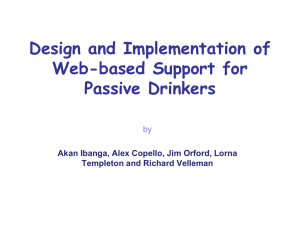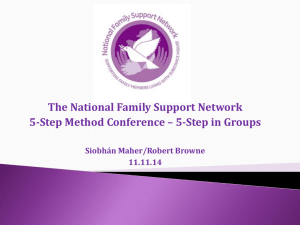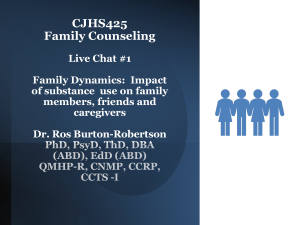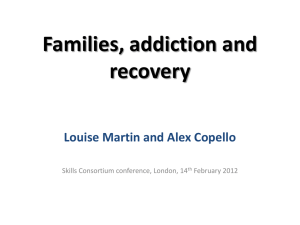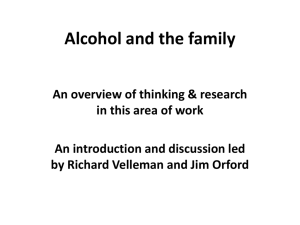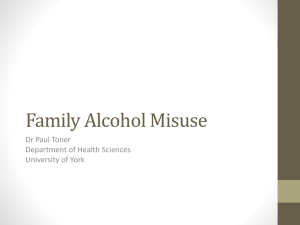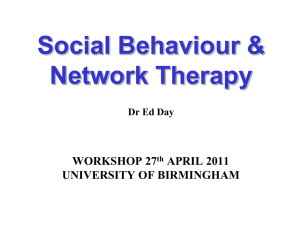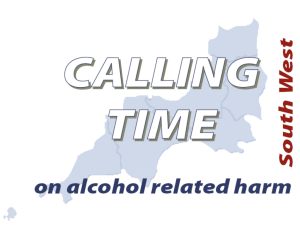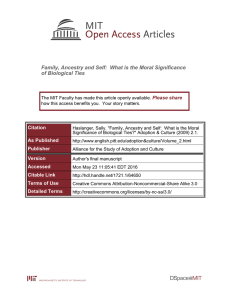In their own right
advertisement
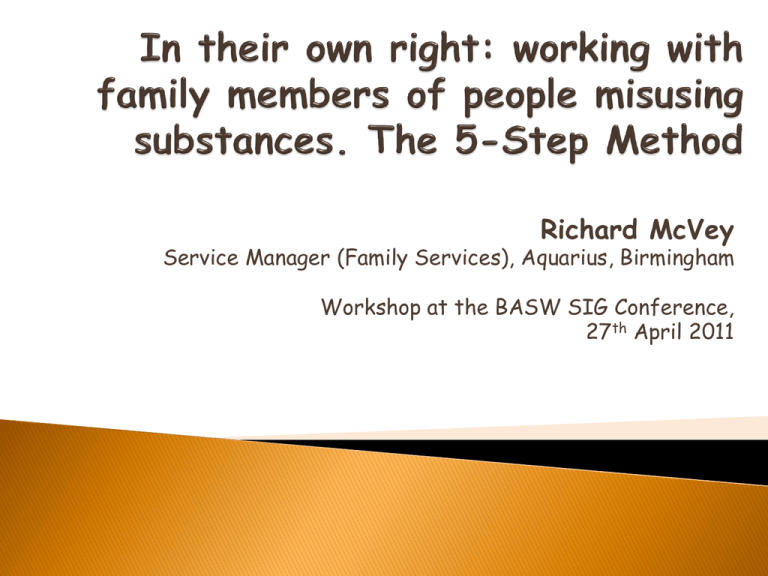
Richard McVey Service Manager (Family Services), Aquarius, Birmingham Workshop at the BASW SIG Conference, 27th April 2011 Introductions, overview of working with families, intro to 5-Step and watching round table discussion – 15 minutes Step One – 15 minutes Step Three– 20 minutes Step Four- 20 minutes Final slides and time for questions – 5-10 minutes There are estimated to be millions of family members affected by a relative’s substance misuse. All domains of life can be severely affected. Strong correlations with mental health problems, violence/abuse, neglectful parenting and social exclusion, all of which puts families at greater risk of harm. Children can be particularly affected. Familial (usually parental) substance misuse is one of the most common characteristics of social workers caseloads. Many family members believe the only way things will get better is if the alcohol or drug misuse ceases. Family members are usually very isolated; in many areas there is little help available; for others, they do not know where to go for help, or are too ashamed, embarrassed or frightened to seek help. Family members have a wide range of needs. Historically, there has been a big gap in services for families which help them in their own right. Recently, the needs of families have received much greater attention – drugs strategy, Hidden Harm, Families Green paper, NTA and NICE guidance, the recovery agenda, and the Think Family agenda. Currently unclear how this might change under the Coalition Government and the Big Society agenda. The 5-Step Method is one intervention which has been developed to help family members in their own right. A brief, structured, psycho-social intervention. Derived from the ‘stress-strain-coping-model’, which describes what family members have said about what it is like to live with a substance misuser. Differs from other theories of addiction and the family. ◦ Most importantly they are not blamed or pathologised, but are seen as part of the solution, who also have needs in their own right. It can help family members regardless of the treatment status of the user. It can be delivered flexibly; by a range of practitioners in a range of settings. Developed from what family members told us: Families are stressed by someone else’s problem drinking or drug use; this has an impact on them. The strain of dealing with the substance misuse leads to physical and psychological ill health. There can also be problems in other areas. The strain is influenced by: ◦ Method(s) of coping ◦ Level and quality of social support Watch DVD discussion What are the key principles of the 5-Step Method? How might the intervention be useful in social work practice? 1. 2. 3. 4. 5. Step One ◦ How the problem affects family members ◦ Listen, reassure and explore concerns Step Two ◦ Provide relevant information ◦ About alcohol and drugs but also other issues Step Three ◦ Explore coping responses Step Four ◦ Explore social support Step Five ◦ Explore further options for help & support ◦ Involvement of others in the family ◦ Scope for joint working One day training Delivery guided by manual for professionals Options also to use self-help manual, online selfhelp materials or integrate intervention with group programme Adhere to core principles of the intervention, but plenty of scope for flexibility and creativity Usually 5 sessions but there is a lot of flexibility here as well. Can sit alongside other ways of working and be part of joint working arrangements Issues of safe practice (particularly in relation to domestic violence and safeguarding need to be considered) Outcomes of the intervention – core questionnaires suggested Watch DVD What do you think is most important about Step One? How could you see this step being useful to your practice? What else might you, as social workers, need to consider? Explore how the substance misuse affects family members. Setting boundaries and goals for the rest of the intervention. What family members tell us is most important to them. Normalising. Basic counselling skills. May take more than one session. Step One is incredibly important and must not be rushed. The importance of having accurate information e.g. reducing stress & feeling more in control. Information about drugs, alcohol, addiction and treatment. But also about other things, e.g. housing, benefits, debts, college courses. Using links with other local contacts. ◦ Joint working might be useful here. Watch DVD What do you think is most important about Step Three? How could you see this step being useful to your practice? What else might you, as social workers, need to consider? FMs will probably have tried everything. Uncertainty about how to cope? Is there a ‘best’ way to cope? Reassurance. Empowering change. Consider 3 broad categories of coping: ◦ Engaged ◦ Tolerant ◦ Withdrawal Engaged- Standing up to it • Trying to control my relatives behaviour Being emotional Being assertive Being supportive Tolerant- Putting up with it • • • • Not doing anything Putting my relatives needs before my own Withdrawal- Withdrawing from it • • • Avoiding my relative Being independant Drawing a network diagram In pairs take it in turns to draw a network diagram; think of a case you are currently working with, or consider in relation to a personal goal and how you might need to engage social support to help you achieve your goal. Watch DVD What do you think is most important about Step Four? How could you see this step being useful to your practice? What else might you, as social workers, need to consider? Network diagram What is support? Who or what can be supportive? Improving positive social support Decreasing negative social support Can facilitate links with other services Other services and websites Further reading Help for the family member Help for the misuser Help for others, e.g. children Joint working arrangements Studies in primary & secondary care with a range of professionals in the Bristol/Bath & Birmingham/West Midlands areas. Questionnaire and interview data collected from several hundred family members. Family members (usually female and mothers or partners) have been living with the situation for an average of 8-10 years and are generally very isolated. The intervention can contribute to: ◦ A positive and significant change in coping behaviour. ◦ Statistically significant reduction in symptoms. ◦ Lessening of the impact of the problem. ◦ Insights from qualitative interview data. ◦ Improvements in therapeutic commitment for practitioners e.g. confidence and knowledge, and increased awareness of the importance of working with family members. “It’s just nice to talk to someone who’s not involved…family & friends are too close I think” “It was about the first time I felt somebody had listened to me….someone was interested in how I was feeling” “She let me find my own way….she helped me to arrive at ways of dealing with things” “It did me good, it was helping me….that was my time…..I felt like I was spoiling myself” “I can’t solve the problem; I’ve got to stand back and that’s helped me” “I feel privileged to have had this help, I can’t thank you enough” “As a Mum, I’m used to only thinking of others” “Personally, I found the sessions a positive professional experiences. I have learnt so much from this client” “It gave me confidence to know that the stuff I had done was actually okay” “I had a fear of working with family members…I’ve crossed that bridge”. “…how important it is to engage with family members in people’s treatment” (if we have time) Watch DVD ‘talking heads’ How do you think the 5-Step Method could enhance social work practice? Acknowledgements Lorna Templeton-Independent Research Consultant (Bristol) Professors Alex Copello, Jim Orford, Richard Velleman Akan Ibanga and many others who have worked with us over the years Further information and reading: Publication of special supplement of the academic journal D:EPP focussed on the 5-Step Method (December 2010). Other research publications and a book (see next slide, D:EPP special issue or contact us) You can contact me: richard.mcvey@aquarius.org.uk 1. 2. 3. 4. 5. 6. 7. 8. 9. Orford J, Natera G, Copello A, Atkinson C, Tiburcio M, Velleman R, Crundall I, Mora J, Templeton L & Walley G (2005) Coping with Alcohol and Drug Problems: The Experiences of Family Members in Three Contrasting Cultures. London; Taylor and Francis. Orford J, Templeton L, Copello A, Velleman R, Ibanga A & Binnie C (2009). Increasing the involvement of family members in alcohol and drug treatment services: the results of an action research project in two specialist agencies. Drugs: Education, Prevention and Policy 1-30 iFirst. Copello A, Templeton L, Orford J, Velleman R, Patel A, Moore L, MacLeod J & Godfrey C (2009). The relative efficacy of two levels of a primary care intervention for family members affected by the addiction problem of a close relative: a randomised trial. Addiction; 49-58. Velleman, R., Arcidiacono, C., Procentese, F. and Copello, A. and Sarnacchiaro, P. (2008). A 5-step intervention to help family members in Italy who live with substance misusers, Journal of Mental Health, 17, 643-655. Orford J, Templeton L, Patel A, Copello A & Velleman R (2007). Qualitative study of a controlled family intervention trial in primary care: I The views of family members. Drugs: Education, Prevention and Policy 14 (1); 29-47. Copello A, Velleman R & Templeton L (2005). Family interventions in the treatment of alcohol and drug problems. Drug & Alcohol Review 24(4); 369-385. Velleman R & Templeton L (2003). Alcohol, Drugs and the Family: A UK Research Programme. European Addiction Research 9(3), 103-112. Copello A, Orford J Velleman R, Templeton L & Krishnan M (2000). Methods for reducing alcohol and drug related family harm in non-specialist settings. Journal of Mental Health, 9, 329-343. Templeton L, Velleman R & Russell C (2010). Psychological Interventions with Families of Alcohol Misusers: A Systematic Review. Addiction Research & Theory (forthcoming). A special issue of ‘Drugs: Education, Prevention and Policy’ (later in 2010) will be devoted to our programme of research and the 5-Step Method .
